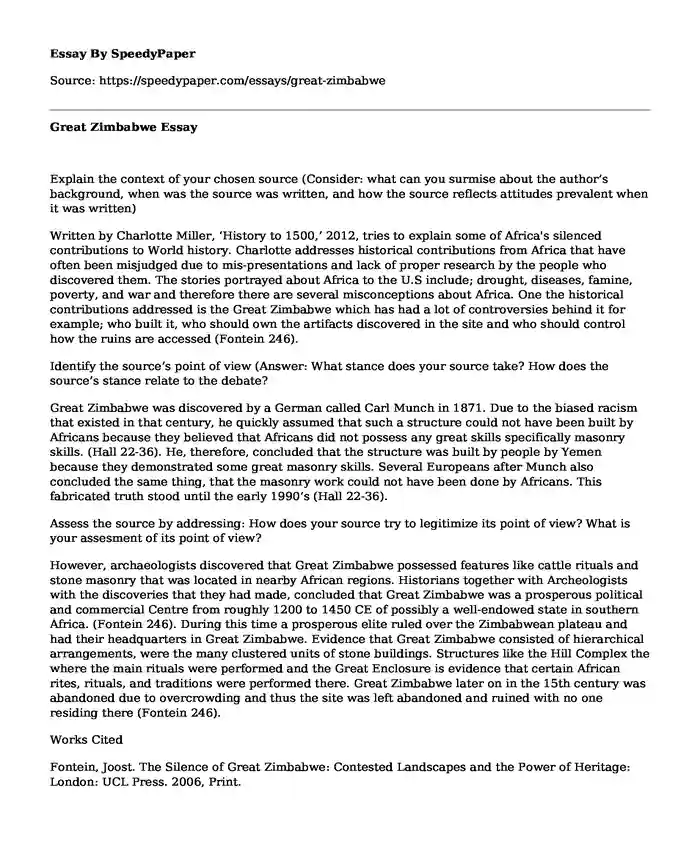Explain the context of your chosen source (Consider: what can you surmise about the author's background, when was the source was written, and how the source reflects attitudes prevalent when it was written)
Written by Charlotte Miller, 'History to 1500,' 2012, tries to explain some of Africa's silenced contributions to World history. Charlotte addresses historical contributions from Africa that have often been misjudged due to mis-presentations and lack of proper research by the people who discovered them. The stories portrayed about Africa to the U.S include; drought, diseases, famine, poverty, and war and therefore there are several misconceptions about Africa. One the historical contributions addressed is the Great Zimbabwe which has had a lot of controversies behind it for example; who built it, who should own the artifacts discovered in the site and who should control how the ruins are accessed (Fontein 246).
Identify the source's point of view (Answer: What stance does your source take? How does the source's stance relate to the debate?
Great Zimbabwe was discovered by a German called Carl Munch in 1871. Due to the biased racism that existed in that century, he quickly assumed that such a structure could not have been built by Africans because they believed that Africans did not possess any great skills specifically masonry skills. (Hall 22-36). He, therefore, concluded that the structure was built by people by Yemen because they demonstrated some great masonry skills. Several Europeans after Munch also concluded the same thing, that the masonry work could not have been done by Africans. This fabricated truth stood until the early 1990's (Hall 22-36).
Assess the source by addressing: How does your source try to legitimize its point of view? What is your assesment of its point of view?
However, archaeologists discovered that Great Zimbabwe possessed features like cattle rituals and stone masonry that was located in nearby African regions. Historians together with Archeologists with the discoveries that they had made, concluded that Great Zimbabwe was a prosperous political and commercial Centre from roughly 1200 to 1450 CE of possibly a well-endowed state in southern Africa. (Fontein 246). During this time a prosperous elite ruled over the Zimbabwean plateau and had their headquarters in Great Zimbabwe. Evidence that Great Zimbabwe consisted of hierarchical arrangements, were the many clustered units of stone buildings. Structures like the Hill Complex the where the main rituals were performed and the Great Enclosure is evidence that certain African rites, rituals, and traditions were performed there. Great Zimbabwe later on in the 15th century was abandoned due to overcrowding and thus the site was left abandoned and ruined with no one residing there (Fontein 246).
Works Cited
Fontein, Joost. The Silence of Great Zimbabwe: Contested Landscapes and the Power of Heritage: London: UCL Press. 2006, Print.
Hall, Martin. and Stefoff, Rebecca. Great Zimbabwe. New York: Oxford University Press. 2006. Print.
Cite this page
Great Zimbabwe. (2022, Apr 21). Retrieved from https://speedypaper.net/essays/great-zimbabwe
Request Removal
If you are the original author of this essay and no longer wish to have it published on the SpeedyPaper website, please click below to request its removal:
- The Criminal Justice System in Our Free Essay
- Essay Sample on Sociology and the Media
- Pathophysiology Paper Sample on Diabetes 2
- Research Paper on Shortage of Airline Pilots in the United States
- Essay Sample: Calls for Government Engagement in Food Industry Sector
- How the Media Is Biased Towards Progressive-Liberal Values. Paper Example
- Essay Sample on Improving Personal and Organizational Communication
Popular categories





